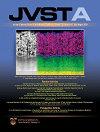磁控共溅射 Ti:Zr-O-N 薄膜的硬度、附着力和磨损行为
IF 2.1
3区 材料科学
Q3 MATERIALS SCIENCE, COATINGS & FILMS
引用次数: 0
摘要
使用反应磁控溅射沉积 Ti:Zr-O-N 薄膜,方法是使用单个 Zr 靶件,在 Zr 溅射靶件的侵蚀轨道上放置 Ti 带。Zr-O-N 薄膜也在同一腔室中沉积,用作参考薄膜。钛带的数量、施加的溅射电流和反应气体流量是可变参数。对薄膜的结构发展和机械性能(仪器压痕、粘附划痕测试和磨损分析)进行了分析。薄膜要么是无定形的,要么由基于锆和钛氧化物或氮化物的结晶相混合物组成。参考薄膜(无钛沉积)的硬度值介于 10 至 11 GPa 之间,其中一种钛:Zr-O-N 薄膜的硬度值最高可达 22 GPa。与其余样品相比,无钛沉积薄膜在出现第一道裂纹(Lc1,临界载荷 1)和第一道分层(Lc2,临界载荷 2)时与基底的粘附性方面表现稍好,这种现象可能与这些薄膜的硬度较低有关,在出现分层之前,这些薄膜可以承受金刚石压头引起的塑性变形。在磨损测试中,与基体的附着力是一个关键特征,因为有些涂层会出现严重分层。本文章由计算机程序翻译,如有差异,请以英文原文为准。
Hardness, adhesion, and wear behavior of magnetron cosputtered Ti:Zr-O-N thin films
Reactive magnetron sputtering was used to deposit Ti:Zr-O-N thin films, by using a single Zr target, with Ti ribbons placed on the erosion track of the Zr sputtering target. Zr-O-N thin films have been also deposited in the same chamber to be used as reference films. The number of Ti ribbons, the applied sputtering current, and the reactive gas flow were the variable parameters. The films were analyzed in terms of structural development and mechanical properties (instrumented indentation, adhesion scratch testing, and wear analysis). The films are either amorphous or composed of a mixture of crystalline phases based on zirconium and titanium oxides or nitrides. Hardness values are situated between ∼10 and 11 GPa for the reference films (deposited without Ti) and up to ∼22 GPa for one of the Ti:Zr-O-N films. The films deposited without Ti behave slightly better in terms of adhesion to the substrate in comparison to the remaining samples in relation to the occurrence of first cracks (Lc1, critical load 1) and for first delamination (Lc2, critical load 2), a phenomenon probably related to the lower hardness of these films, which can accommodate the plastic deformation caused by the diamond indenter, prior to the occurrence of delamination. Adhesion to the substrate is a critical characteristic during wear tests since some of the coatings exhibit severe delamination.
求助全文
通过发布文献求助,成功后即可免费获取论文全文。
去求助
来源期刊

Journal of Vacuum Science & Technology A
工程技术-材料科学:膜
CiteScore
5.10
自引率
10.30%
发文量
247
审稿时长
2.1 months
期刊介绍:
Journal of Vacuum Science & Technology A publishes reports of original research, letters, and review articles that focus on fundamental scientific understanding of interfaces, surfaces, plasmas and thin films and on using this understanding to advance the state-of-the-art in various technological applications.
 求助内容:
求助内容: 应助结果提醒方式:
应助结果提醒方式:


